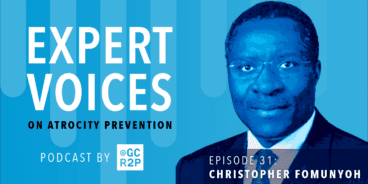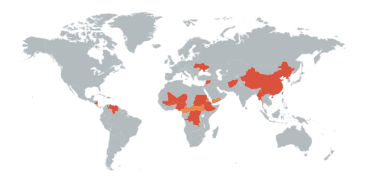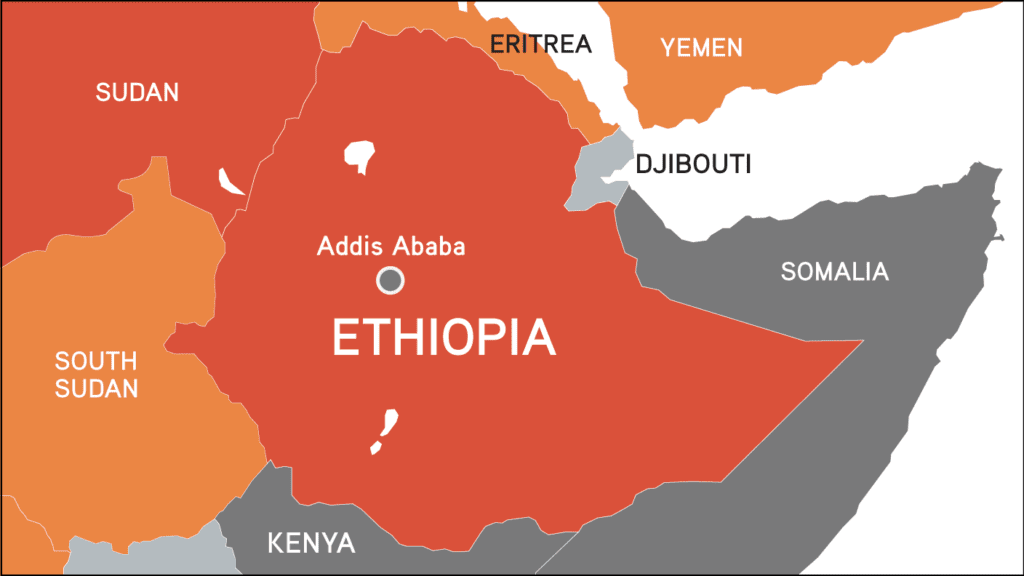
Ethiopia
Despite a peace agreement, populations in the Tigray region of Ethiopia continue to endure war crimes and crimes against humanity. Populations also continue to be at risk due to inter-communal violence and clashes with government forces, particularly in the Amhara and Oromia regions.
BACKGROUND:
On 2 November 2022 the federal government of Ethiopia and the regional governing Tigray People’s Liberation Front (TPLF) agreed to a cessation of hostilities agreement (CoHA), brokered by the African Union, aimed at ending their two-year conflict. From November 2020 – November 2022 the Ethiopian National Defense Forces (ENDF) and its allies, including the Eritrean Defense Forces (EDF), fought in an armed conflict with the Tigray Defense Forces (TDF) in northern Ethiopia, which was characterized by widespread violations of International Humanitarian Law (IHL) and International Human Rights Law (IHRL). The fighting began in the Tigray region and subsequently spread to the neighboring Afar and Amhara regions in July 2021. The conflict has caused a humanitarian catastrophe to unfold across northern Ethiopia, with over 1 million people internally displaced.
Possible war crimes and crimes against humanity were committed by all parties. Several UN bodies, including the International Commission of Human Rights Experts on Ethiopia (ICHREE), and international human rights groups documented indiscriminate bombings, ethnic-based killings, sexual violence, forced displacement, use of child soldiers, destruction of cultural heritage and the systematic destruction of food, water and health infrastructure. Amnesty International and Human Rights Watch found that Amhara regional forces and militias and the EDF, with ENDF complicity, were responsible for the ethnic cleansing of Tigrayans from Western Tigray. Amhara authorities subjected the Tigrayan population to abuses and restrictions on the basis of their ethnicity and removed them from the area while simultaneously calling for Amhara residents to settle there.
Despite the CoHA, abuses by the EDF and regional Amhara forces have been reported in Tigray, including looting of civilian property, as well as kidnappings and mass detentions, while the ICHREE and international human rights groups have documented potential war crimes and crimes against humanity, including sexual violence and extrajudicial killings of civilians. Despite multiple warnings from the ICHREE of an imminent risk of future atrocity crimes, UN member states failed to put forward a resolution at the Human Rights Council’s 54th session to renew its mandate, ending international monitoring of the crises in Ethiopia. On 10 October 2023 the UN Special Adviser on the Prevention of Genocide released a statement warning of a heightened risk of genocide and other atrocity crimes.
In April 2023 the government announced plans to integrate regional militia forces into the federal army and police, prompting fears among populations regarding loss of regional autonomy and vulnerability to attacks by other ethnic groups. In the Amhara region, protests against the measure escalated into intense clashes between the fano, an irregular ethnic Amhara militia, and the ENDF, during which the Ethiopian Human Rights Commission (EHRC) has documented the targeting of civilians and civilian property. The ENDF have also been accused of killing civilians while searching for fano supporters.
Inter-communal and inter-religious violence, particularly between the Amhara and Oromo communities, as well as regional border disputes in other parts of Ethiopia continue. Oromia regional security forces, the ENDF and the Oromo Liberation Army (OLA) armed group have committed enforced disappearances and attacks on civilians, including ethnic Amharas. The ENDF have launched repeated airstrikes in Oromia and extrajudicially executed civilians perceived to be supportive of armed groups. Negotiations between the OLA and federal government have stalled.
RECENT DEVELOPMENTS:
On 17 November the Office of the UN High Commissioner for Human Rights (OHCHR) warned of ongoing abuses in Amhara, including arbitrary arrests and drone strikes targeting civilian areas. On 5 February the ENDF went house to house in Merawi and executed at least 50 civilians, including a 6-year-old child, in retaliation for intense clashes with fano militia in the area.
Following community consultations from July 2022 to March 2023 in numerous regions, on 28 December OHCHR and the EHRC released a joint report, encouraging the federal government to implement multiple tracks of transitional justice, including criminal accountability, truth-seeking, reparations and guarantees of non-recurrence.
On 30 December the President of the interim regional authority in Tigray, Getachew Reda, said that 91 percent of the population was exposed to the risk of starvation and death due to ongoing drought and the pervasive impact of the conflict.
ANALYSIS:
Populations in Tigray, Afar and Amhara remain at risk of further war crimes and crimes against humanity due to repeated violations of the CoHA. The unresolved question of the administration of Western Tigray and other disputed territories could reignite conflict, with both Amhara and Tigrayan ethnic groups claiming control over the land. These risks are amplified by the over 370,000 fighters across the country – with access to small arms – who await unfunded demobilization and reintegration.
Civilians in Tigray also remain at risk due to the continued presence of the EDF, which have repeatedly been accused of atrocity crimes while Eritrean authorities have allegedly sought to settle decades-old grievances with the TPLF through the collective punishment of Tigrayans.
Civilians in Oromia remain at heightened risk of atrocities due to fighting between OLA militants and the ENDF. Amharas in Oromia are also particularly vulnerable to attacks by the OLA. The targeting of civilians based on their identity may amount to crimes against humanity.
The non-renewal of the ICHREE incentivizes the federal government to further entrench impunity and undermines victim’s hopes for justice.
Ethiopia’s ethnic-based federalist system has resulted in widespread allegations of ethnic favoritism, deepening distrust between ethnic groups. Under the former TPLF-dominated ruling coalition, which controlled the government for 27 years prior to Prime Minister Abiy Ahmed coming to power in 2018, many groups felt marginalized. A history of impunity and lack of effective transitional justice for human rights abuses perpetrated under successive ruling parties has exacerbated these grievances. The conflict in northern Ethiopia sparked an increase in hate speech between ethnic groups across the country and caused other pre-existing ethnic tensions to flare.
RISK ASSESSMENT:
-
- Residual tensions following the conflict and fragile peace process without credible commitment to its implementation.
- Policy or practice of impunity for – or tolerance of – serious violations of IHL and IHRL, atrocity crimes or their incitement.
- Unresolved inter-communal tensions and the federal government’s attacks on associated ethnic-based militias – many of whom are fighting for autonomy of their group.
- Inflammatory rhetoric, propaganda campaigns or hate speech by political figures to capitalize on the politicization of ethnic identity.
- Lack of trust and confidence in state institutions to resolve conflicts and pursue transitional justice.
NECESSARY ACTION:
While meaningful steps to implement the CoHA and the unfettered delivery of aid have been taken, the process must continue in good faith. The EDF should immediately withdraw from Ethiopia. The UN Security Council should impose an arms embargo and sanctions on spoilers to the peace process.
Due to the lack of confidence in domestic measures, the international community should explore alternative options for accountability, including through universal jurisdiction. The federal government should work with UN Special Procedures and international experts on transitional justice to ensure processes meet international standards.
The government must refrain from violations of international law while conducting military operations and spare no effort to protect civilians. Armed groups must also end the targeting of civilians.
The international community must maintain scrutiny of the crises in Ethiopia following the non-renewal of the ICHREE. Any normalization should be contingent on progress made toward respecting human rights and assurances of inclusive transparent and good faith accountability efforts.
Related Content


The Relationship between Digital Technologies and Atrocity Prevention


